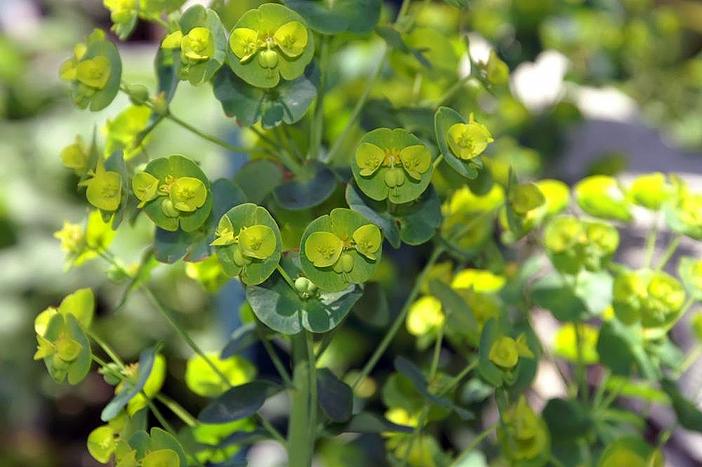Wood Spurge
(Euphorbia amygdaloides var. robbiae)
Wood Spurge (Euphorbia amygdaloides var. robbiae)
/
/

David J. Stang
CC BY-SA 4.0
Image By:
David J. Stang
Recorded By:
Copyright:
CC BY-SA 4.0
Copyright Notice:
Photo by: David J. Stang | License Type: CC BY-SA 4.0 | License URL: https://creativecommons.org/licenses/by-sa/4.0 | Uploader: David Stang | Publisher: Wikipedia Commons
























Estimated Native Range
Summary
Euphorbia amygdaloides subsp. robbiae, commonly known as Wood Spurge, is an evergreen subshrub that is native to woodland areas, forest understories, and rocky sites in parts of Southeast Europe and the Middle East, including Turkey. It typically grows to a height of 1-2 feet and a width of 2-3 feet. This plant is characterized by its rosettes of dark green leaves and heads of yellow-green flowers that appear in the spring. The flowers are not particularly showy, but they do add a subtle charm to the garden. The foliage remains attractive throughout the year.
Wood Spurge is valued for its ability to thrive in dry shade, making it an excellent ground cover for challenging areas under trees where other plants might struggle. It is also used in border plantings and woodland gardens. In cultivation, it prefers partial to full shade, well-drained soil, and requires little maintenance once established. It is drought-tolerant and generally pest-free, although it can be susceptible to leaf spot. Gardeners should handle this plant with care, as its sap can cause skin irritation. It is important to note that Euphorbia amygdaloides var. robbiae can be potentially invasive in some regions, so it is advised to check local guidelines before planting it outside of its native range.CC BY-SA 4.0
Wood Spurge is valued for its ability to thrive in dry shade, making it an excellent ground cover for challenging areas under trees where other plants might struggle. It is also used in border plantings and woodland gardens. In cultivation, it prefers partial to full shade, well-drained soil, and requires little maintenance once established. It is drought-tolerant and generally pest-free, although it can be susceptible to leaf spot. Gardeners should handle this plant with care, as its sap can cause skin irritation. It is important to note that Euphorbia amygdaloides var. robbiae can be potentially invasive in some regions, so it is advised to check local guidelines before planting it outside of its native range.CC BY-SA 4.0
Plant Description
- Plant Type: Herb
- Height: 2-3 feet
- Width: 1-2 feet
- Growth Rate: Moderate
- Flower Color: Green, Yellow
- Flowering Season: Spring, Summer
- Leaf Retention: Evergreen
Growth Requirements
- Sun: Full Sun, Part Shade
- Water: Low, Medium
- Drainage: Fast
Common Uses
Bee Garden, Bird Garden, Border Plant, Butterfly Garden, Deer Resistant, Drought Tolerant, Groundcover, Low Maintenance, Potted Plant, Rabbit Resistant, Rock Garden, Salt Tolerant, Showy Flowers, Street Planting
Natural Habitat
Native to woodland areas, forest understories, and rocky sites in Southeast Europe and the Middle East
Other Names
Common Names: Mrs Robb’s-Bonnet , Spurge , Robb-Wolfsmilch , Turkisk Mandeltörel
Scientific Names: Euphorbia amygdaloides var. robbiae , Euphorbia amygdaloides subsp. robbiae , Euphorbia robbiae , Tithymalus robbiae
GBIF Accepted Name: Euphorbia amygdaloides subsp. robbiae (Turrill) Stace